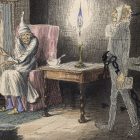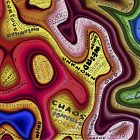Herman Melville and the Desolation of Solitude

In an episode of his podcast Into the Zone, author Hari Kunzru goes with fellow author Geoff Dyer to visit the home of one of their shared literary idols. On the car ride there, Dyer asks Kunzru how he feels about literary pilgrimage. Kunzru responds, “I am always up for literary pilgrimage, but I am almost always disappointed.” Bleak-spirited as this is, I have to admit that I identified with the notion when I visited Arrowhead, Herman Melville’s historic home in the thinly populated Berkshire Mountains of Western Massachusetts. I’d not gone up to the area specifically to commune with the spirit of the legendary writer, but was instead there to visit my parents and escape Florida’s herd immunity approach to the coronavirus. Isolating myself with Melville was not an act borne of desire, but rather one borne of grave disappointment. In all my years of visiting the area, I’d never felt the urgency to see Arrowhead, but suddenly robbed of my own social life, it was time for me to go and see why a writer, like Melville, would actually ask for such dramatic solitude.
Lesley Herzberg, the director of the Berkshire Historical Society who had indulged my strange request to spend twenty-four hours on the grounds under her organization’s care (assured by my promise to tread lightly—I would sleep in my camper van), gave me a revealing tour before my stay. She showed me how the home was rural, but also a short walk through the woods to the Pittsfield Country Club and the homes of Melville’s relatives and friends. She showed me how just off to the side of his study—where he wrote Moby Dick—was a small cot that his very close pal Nathaniel Hawthorne slept on with some regularity. She told me how Melville spent days working the fields outside of Arrowhead with a small crew of workers. In truth, I hadn’t known much about his personal life prior to the visit; the level of sociality I came to understand he lived upended any vision I once had of the author as a cloistered genius cranking out seminal work in isolation. Besides Bartleby, The Scrivener, the first Melville story I’d read was Typee, an early account of his time spent as a castaway among the indigenous tribes of the South Pacific. Though a great many scenes of companionship are drawn, the sailor ultimately chooses to leave. I’d imagined the writer as somebody on a solitary quest.
In visiting Arrowhead, I had wanted to keep some specific aspect of the writer in mind. Focusing on Typee could have been an option, but there were other stories, other Mevilles to choose from. From his early seafaring tales through a period of pastoral poems, Melville contains multitudes. A passage from Moby Dick that I’d always been fond of ultimately felt like it made the most sense—phonetically and thematically, it seemed like the right approach for these times. In a description of the crew of the Pequod, Melville writes, “Isolatoes too, I call such, not acknowledging the common continent of men, but each isolato living on a separate continent of his own. Yet now, federated along one keel, what a set these Isolatoes were!” What did Melville mean? Just that the crew was literally all from different places in the world? No, there was a deeper meaning hidden in the words, and clues made themselves apparent as ever after a day at his home.
Much to my surprise, not a lot has been written about this Melville passage. It’s occasionally used as an epitaph at the outset of an essay that’s about something else entirely, though artist Marlene Angeja’s “Isolatoes” project is an abstraction of the concept of solitude for sure. I had to dig deeper to find someone who’d said something that spoke to me on the subject. In a 1971 M.A. dissertation called “Isolation and the Will: A Study of Herman Melville’s Isolatoes,” writer Marco Pietro Lo Verso wrote, “Critics have, for the most part, chosen to view isolation in Melville more from the point of view of the ‘quester’ or defier, i.e., considering characters such as Taji, Pierre, and, most notably, Ahab. Such characters are generally described as very strong-willed individuals who are basically dissatisfied with the common lot of man; as a result, they tend to dictate their lives to very self-centered quests for absolutes.” Lo Verso’s interpretation of the concept and Melville and his characters is spot on. The man whose isolation is self-imposed through repudiation of his social ties creates sorrow for himself and pain for others. Ahab, for example, repudiates his social ties in a monomaniacal effort to kill the white whale. Nobody wins. This is Melville’s lament. He wrote a character like Ahab not because he envied his self-reliance, but because he pitied his isolation. Melville notoriously referred to the self-reliance of transcendentalists as “oracular gibberish”—a rare moment of animosity from an author who cherished the fraternity of man. The pity for Ahab, I learned, was a very archetypal self-pity. Melville isolated himself so that he would have the isolation to write against. It was a somewhat luxurious indulgence.
Besides writing, Melville never did anything alone. He tilled the toil with a work crew. He hiked mountains with writer pals like Longfellow and Hawthorne. Even when Melville wrote, he sought companionship. In the morning, I stood on the piazza at his home—a location that inspired an entire collection of works, called The Piazza Tales—and tried to briefly enter his headspace. The eponymous story from that collection is about standing on the piazza alone, staring at the hills in the offing, and wondering how the “fairies” in the hills are living. What the narrator of that story learns is that the hill-dwellers are wondering the same about him as they stare down into the pasture. The piece is about the tragedy of isolation: unrequited sociality. Staring at Mount Greylock, whose bald forehead was said to inspire the white whale, I realized that Melville had the desire to be at sea again, among shipmates.
The next day, sitting out in the pasture in the Hawthorne Studio, built by a local nonprofit called The Mastheads, I felt truly alone. For a moment, I indulged in self-pity. How lucky was I to be able to create isolation for myself? I felt like Ahab did upon realizing who he’d become in his vision quest: “When I think of this life I have led; the desolation of solitude it has been; the masoned, walled-town of a Captain’s exclusiveness, which admits but small entrance to any sympathy from the green country without—oh, weariness! heaviness!” Isolation was no longer a luxury for Ahab—a realization that Melville likely came to in those dark rural Berkshire nights, and a realization that I come to continually as the pandemic carries on.
There are scenes in Moby Dick, which I rifled through for the umpteenth time while I sat in the pasture, that would make any 2020 coronavirus isolato green with envy. To some, one particular scene from the book is gross, or evocative, but it seems like a dream now. The crew of the Pequod is squeezing whale oil together. “Squeeze! squeeze! squeeze!” Melville writes. “All the morning long; I squeezed that sperm till I myself almost melted into it; I squeezed that sperm till a strange sort of insanity came over me; and I found myself unwittingly squeezing my co-laborers’ hands in it, mistaking their hands for the gentle globules.” It’s difficult to imagine this level of closeness today. To imagine squeezing the hand of a fellow isolato. Lo Verso wrote, “Ironically, then, it is the quester’s exercise of an extreme freedom of will which is basically responsible for his self-imprisonment and his isolation from his fellow man.” We see that in Ahab’s “desolation of solitude” and I came to realize it, too. I’d exercised my freedom by driving to Massachusetts from Florida, by staying at Arrowhead. I wonder if Melville would have risked coronavirus to be around his fellow man. If he would have pitied me in my isolation.
Melville never enjoyed the great success that Moby Dick warranted when he was alive. According to Herzberg, he notoriously burned many of his remaining manuscript pages before his death. It was only when his granddaughter discovered a version of Billy Budd hidden in a breadbox at Arrowhead, and published it, that Melville’s legacy was cemented. Herzberg also told me about how Hawthorne would often grow weary of Melville’s ranting, despite their companionship. I wonder if this lack of success was the ultimate failure of his isolation. He wrote out into the landscape but never got back what he put in.



